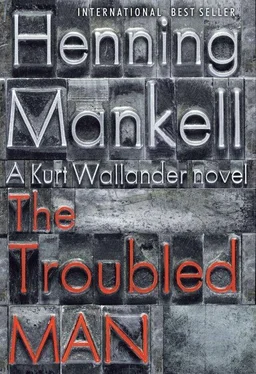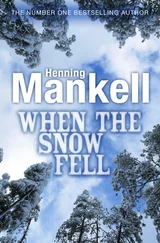“I was just on my way home,” said Wallander. “I needed to get some papers from my office.”
“Do you have a moment? I have some good news that I’d like to share with somebody.”
“I have all the time in the world,” said Wallander, making no attempt to conceal the irony that he knew would pass over Mattson’s head.
They went to the chief of police’s office. Wallander sat down on one of the guest chairs. Mattson opened a folder lying on his neat and tidy desk.
“Good news, as I said. Here in Skåne we have one of the best closure rates in the country. We solve more crimes than almost everybody else. We’ve also improved the most from the previous year. That’s just what we need to inspire us to even greater things.”
Wallander listened to what his boss had to say. There was no reason to doubt the report. But Wallander knew that interpreting statistics was like pulling rabbits out of a hat. You could always present a statistic as fact even if it was an illusion. Wallander and his colleagues were painfully aware that the closure rate in Sweden was among the lowest in the world. And none of them believed they’d hit rock bottom yet. Things would continue to get worse. Constant bureaucratic upheavals meant an equally constant increase in the negative flow of unsolved crimes. Competent police officers were fired, or diverted into other duties until they were no longer able to make a meaningful contribution. It was more important to check boxes and meet targets than to really get down to investigating crimes and taking crooks to court. Moreover, Wallander and most of his colleagues thought that the priorities were all wrong. The day that police chiefs decreed “minor crimes” must be tolerated, the rug had been pulled out from under the remains of a trusting relationship between the police and the general public. The man in the street was not prepared to shrug his shoulders and merely accept that somebody had broken into his car or his garage or his summer cottage. He wanted these crimes to be solved, or at least investigated.
But that wasn’t something Wallander felt like discussing with Lennart Mattson right now. There would be plenty of opportunities for that during the fall.
Mattson slid the report to one side and looked at his visitor with a troubled expression on his face. Wallander could see that he had sweat on his brow.
“How are you feeling? You look pale. Why haven’t you been getting some sun?”
“What sun?”
“The summer hasn’t been all that bad. I made a trip to Crete, so we’d be sure to have some decent weather. Have you ever visited the palace at Knossos? There are fantastic dolphins on the walls there.”
Wallander stood up.
“I feel fine,” he said. “But since it’s sunny today, I’ll take your advice and make the most of it.”
“No forgotten guns anywhere, I hope?”
Wallander stared at Lennart Mattson. He came very close to punching him in the nose.
Wallander returned to his office, sat down on his chair, put his feet on his desk, and closed his eyes. He thought about Baiba. And Mona shivering away in her rehabilitation clinic. While his boss gloated over a statistic that was no doubt economical with the truth.
He took down his feet. I’ll make another attempt, he thought. Another attempt to understand why I’m always doubtful about the conclusions I reach. I wish I had more insight into political goings-on; then I would probably be less confused than I am now.
He suddenly recalled something he’d never thought about as an adult. It must have been 1962 or 1963, sometime in the fall. Wallander had a Saturday job as an errand boy for a flower shop in central Malmö. He had been instructed to deliver a bouquet of flowers as quickly as possible to the People’s Park. The prime minister, Tage Erlander, was giving a lecture, and when he had finished a little girl was supposed to hand him the flowers. The problem was that somebody in the local Social Democratic Party office had forgotten to order the flowers. So now there was an emergency. Wallander pedaled away for all he was worth. The flower shop had warned the People’s Park officials that he was on his way, and he was allowed in without delay. The little girl designated to present the flowers received them in time and Wallander received a tip of no less than five kronor. He was offered a glass of soda, and stood with a straw in his mouth, listening to the tall man at the lectern speaking in his strange nasal voice. He used a lot of big words — or at least words that Wallander was unfamiliar with. He spoke about détente, the rights of small countries, the neutrality of Sweden, with its freedom from all kinds of pacts and treaties. Wallander thought he’d understood that, at least, from what the great man had said.
When Wallander came home that evening he went to the room his father used as a studio. He could still remember even now that his father was busy painting in the forest background he used in all his pictures. When he was a teenager Wallander had a good relationship with his father — that might have been the best time in their shared existence. It would be another three, perhaps four years before Wallander came home and announced that he was going to become a police officer. His father had gone through the roof and come close to throwing him out — in any case, he refused to talk to him for quite some time.
Wallander had sat on a stool next to his father and told him about his visit to the People’s Park. His father often muttered that he wasn’t interested in politics, but Wallander eventually realized that this wasn’t the case. His father always voted faithfully for the Social Democrats, was angrily skeptical about the Communists, and always criticized the non-socialist parties for favoring citizens who were already leading a comfortable life.
The conversation with his father that day came back to him now, almost word for word. Earlier, his father had always spoken positively about Erlander, maintaining that he was an honest man you could trust, unlike many other politicians.
“He said that Russia is our enemy,” Wallander said.
“That’s not completely true. It wouldn’t do any harm if our politicians devoted a thought or two to the role America plays nowadays.”
Wallander was surprised by what he said. Surely America represented the good guys? After all, they were the ones who had defeated Hitler and the Nazis’ Thousand-Year Reich. America produced movies, music, clothes. As far as Wallander was concerned, Elvis Presley was the King, and there was nothing to beat “Blue Suede Shoes.” He had stopped collecting everything he could find about Hollywood stars, but still there was nobody to beat Alan Ladd. Now his father was implying that you had to be on your guard where America was concerned. Was there something Wallander didn’t know?
Wallander repeated the prime minister’s words: the neutrality of Sweden, with its freedom from all kinds of pacts and treaties . “Is that what he said?” his father had commented. “The fact is, American jets fly through Swedish air space. We pretend to be neutral, but at the same time we play along with NATO and more specifically with America.”
Wallander pressed his father on what he meant, but he didn’t get an answer, only some inaudible mumbling and then a request to be left in peace.
“You ask too many questions.”
“But you’ve always said that I shouldn’t be afraid to ask you if there was something I wondered about.”
“There has to be a limit.”
“Where is it?”
“Right here. I’m making mistakes when I paint.”
“How is that possible? You’ve been painting the same picture every day since long before I was born.”
“Go away! Leave me in peace!”
Читать дальше












